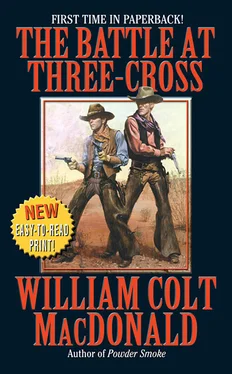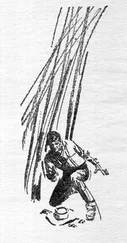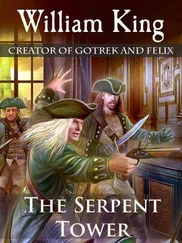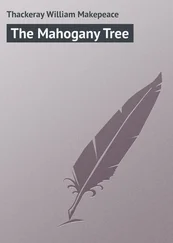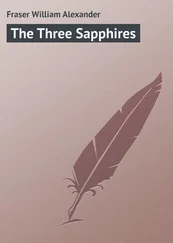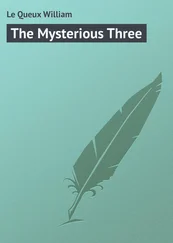William MacDonald - The Battle At Three-Cross
Здесь есть возможность читать онлайн «William MacDonald - The Battle At Three-Cross» весь текст электронной книги совершенно бесплатно (целиком полную версию без сокращений). В некоторых случаях можно слушать аудио, скачать через торрент в формате fb2 и присутствует краткое содержание. Жанр: Старинная литература, на английском языке. Описание произведения, (предисловие) а так же отзывы посетителей доступны на портале библиотеки ЛибКат.
- Название:The Battle At Three-Cross
- Автор:
- Жанр:
- Год:неизвестен
- ISBN:нет данных
- Рейтинг книги:3 / 5. Голосов: 1
-
Избранное:Добавить в избранное
- Отзывы:
-
Ваша оценка:
- 60
- 1
- 2
- 3
- 4
- 5
The Battle At Three-Cross: краткое содержание, описание и аннотация
Предлагаем к чтению аннотацию, описание, краткое содержание или предисловие (зависит от того, что написал сам автор книги «The Battle At Three-Cross»). Если вы не нашли необходимую информацию о книге — напишите в комментариях, мы постараемся отыскать её.
The Battle At Three-Cross — читать онлайн бесплатно полную книгу (весь текст) целиком
Ниже представлен текст книги, разбитый по страницам. Система сохранения места последней прочитанной страницы, позволяет с удобством читать онлайн бесплатно книгу «The Battle At Three-Cross», без необходимости каждый раз заново искать на чём Вы остановились. Поставьте закладку, и сможете в любой момент перейти на страницу, на которой закончили чтение.
Интервал:
Закладка:
The men Oscar had picked were six, all of them lean, hard, weathered individuals who talked little unless they had something to say. To Cal Braun fell the job of driving the chuck wagon and preparing food, a task at which he was a master. Tom Piper drove Katherine’s wagon and looked after the horses. In addition to these two were Trunk-Strap Kelly, Hub Owen, Luke Homer and Lanky Peters. Lanky Peters was built like a fence rail and as tough as rawhide; he knew that section of Mexico to which the party was going and, most important and surprising, possessed a smattering of the Yaquente language, being himself of one eighth Yaquente blood—just about enough, as Lanky drawlingly expressed it, “to fill a whisky glass.” A dozen saddle horses accompanied the expedition, those not in use being tethered to the wagons.
Forage and water were none too plentiful along the dim trail they were following, but they managed to make out. A few squalid towns had been passed. Now on this, the fourth day of the journey, they were headed toward the town of Muletero, a few miles beyond which was situated the Gregory Three-Cross Ranch. It was expected to reach the ranch by night. Horses and men—and Katherine—were covered with dust, but everyone was in high spirits. Particularly the professor. Each day of the trip he had ranged ahead of the wagons and, accompanied by Katherine and one or two of the men, had made excursions along the hillsides in search of precious specimens or material for his notebooks. There hadn’t been any attempt to make speed on the journey.
It was still early, only half an hour after the morning start. Katherine, Jones, Oscar and Lance rode ahead. The others and the wagons were strung out behind. On either side—and often directly in front—huge sahuaro cacti raised gigantic heads above their surrounding vegetation. There seemed to be thousands of them growing in the coarse outwash soil swept down from the sheltering hills.
Oscar had been watching them for some time as his body moved easily to the motion of the horse. “The feller that named them sahuaros ‘Sentinels of the Desert’ sure said a mouthful, Professor. Watch ’em for a spell and you’d almost believe they were ready to come alive. They got personality, I claim.”
“Over in western Arizona,” Lance put in, “there’s a lot of those sahuaros. The Papago Indians up that way dry out the fruit and then grind the seeds into a sort of meal——”
“For a fact?” Jones demanded quickly. “Lance, why haven’t you told me this before? I must make a note——”
“You never asked me.” Lance grinned. “There’s quite a few things like that we Southwesterners know, but, Professor, you got us where we’re almost afraid to open our mouths about cacti. You know too much for us. For instance”—pointing to a cane-branched opuntia a short distance from the side of the trail—“if I told you that was called a ‘tesajo’ you’d give me some other long, unpronouncable name.”
Jones glanced briefly at the plant in question. “I think you’re right—for once.” He smiled. “Cholla family, of course. Probably— opuntia emoryi . Not certain, of course, without closer observation.”
Katherine’s laughter joined Oscar’s. Lance said ruefully, “You see, I’m always being corrected.”
“Someday,” Katherine said, “when I build a house of my own, I’m going to plant a sahuaro in my garden.” She paused at exclamations from the others. “Lordy, no!” She smiled. “Not one of those huge things. I want one just large enough to give me those luscious creamy blossoms and have woodpeckers nest in it like they do in the desert.”
“Incident’ly”—Oscar frowned—“I don’t ever remember seeing a small sahuaro. They’re all full size by the time they come on view. I ain’t never seen a baby giant cactus.”
“Not likely to,” Jones said. “Hard to find—possess ability—hide among rocks and brush. Often—ten, twenty years old—before they push up above their surroundings. Grow rapidly—from then on.” He paused, then added, “Grew one from seed—five years ago. At two years it—looked like—small green ball—three-quarter-inch diameter. Long yellow spines…”
Horses and wagons moved on under the hot morning sky. Behind the riders listening to Jones’s dissertation on cacti there sounded the occasional squeak of a wagon wheel or the creaking of saddle leather. The way was leading into higher terrain now. The slopes on either side were spotted with ironwood and paloverde trees. There was more rock than seen on the previous day and the vegetation had a greener look. An occasional organ-pipe cactus appeared.
Jones pointed one out. “There, Lance—true organ pipe— Pachycereus marginatus .”
The procession moved around the shoulder of a rock-cluttered hill. Ahead and to the left a long, gradual slope lifted to dizzy peaked heights scarred with dark ravines and hollows. Jones eyed the scene with fresh interest. “Some timber up there,” he announced. “Think I’ll have a look. Come on, Katherine. We’ll pick up the wagons later. Want to come, Lance?”
Lance hesitated. Ever since he’d crawled from his bed at sunrise he’d had an uneasy sensation of being watched by unseen eyes. Just what it was he didn’t know, but some premonition of approaching danger warned him to go slow.
“We-ell, I don’t know.” He hesitated. “Why not pass up the cactus hunt for the day, Professor? I feel we should push along to the Three-Cross. We should get there to night. Once you’ve established your headquarters you can roam around this country to your heart’s content.”
“Maybe Lance has the right idea,” Katherine commented.
“Nonsense!” Jones said impatiently. “No time like the present. Such observations as I make along the way will save later repetition.”
“Suits me.” Katherine nodded. “Lance, it’s not really necessary you should go if you feel you should stay with the wagons. Oscar or one of the other men can go.”
“I’d better stay with the wagons,” Oscar said. He slid a paper bag from his pocket and put a lemon drop into his mouth. “You ought to take one of these. They’re sure good for cuttin’ the dust in your throat.”
They talked a few minutes more. Jones was intent on his cacti search and wouldn’t be swayed from his determination. Reluctantly Lance decided to go with them. He turned, frowning, to Oscar. “We’ll try to pick you up by dinnertime. Don’t go on until we show up.”
“You’ll pick us up by dinnertime,” Oscar scoffed, “providing the professor doesn’t forget the time like he did day before yesterday.”
“I apologize again”—Jones smiled—“for that tardiness. But—opportunity of lifetime— Astrophytum myriostigma —such variety—three-ribbed specimen—worth being two hours—late for dinner. You don’t understand.”
“I’m afraid I don’t,” Oscar said dryly.
“Well, see you later.” Lance nodded. He put spurs to his roan gelding and pushed up alongside Katherine, who rode between him and the professor. They jogged along the ancient wagon trail for an hour where it wound between hills and around huge blocks of black basalt rock. The ponies climbed steadily. Once, looking back and down, Lance saw the wagons and riders of the expedition, tiny in the sun-drenched distance.
Finally the professor led the way from the old trail up a gradually ascending slope. He wound in and out among clumps of paloverde. There were no more of the big cacti to be seen now, though an occasional growth of prickly pear or cholla pushed up through the brush. In time they commenced to see stunted pine trees and scrub oak and piñon. Quail whirred out of the brush, and startled jack rabbits scurried frantically for shelter. Rocks the size of an ordinary house bulked huge in every direction. Here and there scarred watercourses, made by the rainy seasons’ runoff, cut deep ravines and gulleys. The trees grew taller too.
Читать дальшеИнтервал:
Закладка:
Похожие книги на «The Battle At Three-Cross»
Представляем Вашему вниманию похожие книги на «The Battle At Three-Cross» списком для выбора. Мы отобрали схожую по названию и смыслу литературу в надежде предоставить читателям больше вариантов отыскать новые, интересные, ещё непрочитанные произведения.
Обсуждение, отзывы о книге «The Battle At Three-Cross» и просто собственные мнения читателей. Оставьте ваши комментарии, напишите, что Вы думаете о произведении, его смысле или главных героях. Укажите что конкретно понравилось, а что нет, и почему Вы так считаете.
